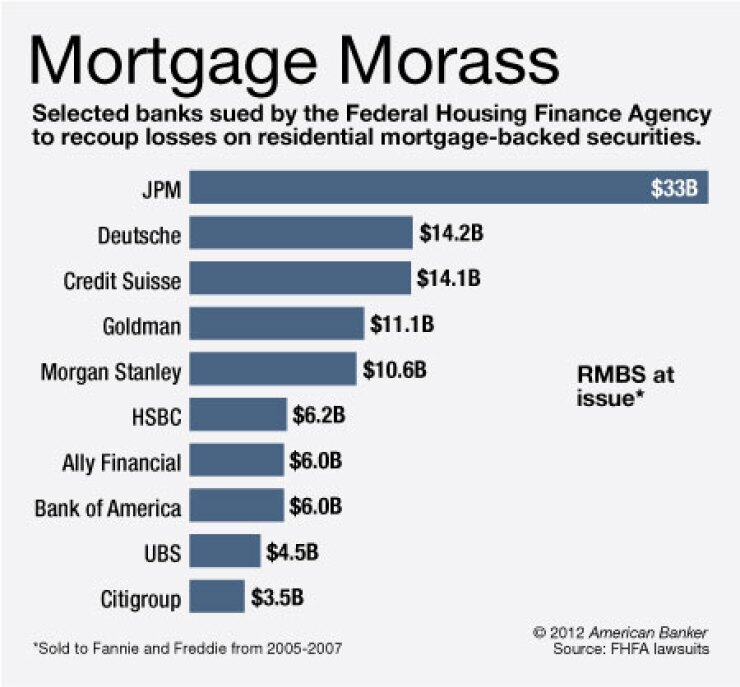-
Goldman Sachs (GS) is asking the U.S. Supreme Court to overturn a lower-court decision involving securities backed by residential mortgages the company says would cost financial firms tens of billions of dollars.
November 5

A lawsuit that accuses Bank of America (BAC) and U.S. Bancorp (USB) of neglecting to protect mortgage investors may proceed, a federal judge in Manhattan has ruled.
The decision, made Friday by U.S. District Judge Katherine Forrest of the southern district of New York, means the companies must prepare to defend themselves against allegations by the Policemen's Annuity and Benefit Fund of the City of Chicago of failing to uphold their responsibilities as trustees for securities backed by residential mortgages sold by Washington Mutual, the failed mortgage lender that JPMorgan Chase (JPM) acquired in 2008.
Over a roughly 18-month period beginning in 2006, the pension fund purchased certificates in five of 41 trusts of mortgage-backed securities that were underwritten and sold by Wamu. Bank of America succeeded LaSalle Bank, the original trustee for the trusts, after Bank of America acquired LaSalle in 2007. U.S. Bancorp succeeded Bank of America as trustee following Bank of America's acquisition of Countrywide Financial in 2008, when Bank of America was obligated to step down as trustee because the trusts contained some loans some originated by Countrywide.
The lawsuit, which the pension fund filed in April as a class action on behalf of investors in all 41 trusts, alleges that Bank of America and U.S. Bancorp violated promises to investors they made under the trusts' respective pooling and service agreements, which obligated the trustee to review loan files for defective documentation, notify Wamu of incomplete mortgage files and enforce investors' prerogative to insist that Wamu repurchase loans that had deficiencies.
The trustees' failures to uphold their responsibilities caused a decline of millions of dollars in the value of the securities, according to the fund.
In their motion to dismiss the case, the banks contended that the fund could not sue over certificates it did not purchase, and that they cannot be liable for LaSalle's responsibilities. U.S. Bancorp also asserted it could not be liable for any of the alleged failures because the fund sold all of its certificates before U.S. Bancorp became trustee.
Forrest ruled that the fund could continue its lawsuit with respect to its own certificates and on behalf of investors in certificates that are backed by loans that back certificates the fund bought.
"The court, therefore, finds that, to the extent that any of the trustee's alleged breaches caused diminution in the value of plaintiff's certificates (based on mortgagors' defaults in principal or interest payments), investors holding tranches backed by the same loan group as plaintiff's tranches have the 'same set of concerns' as plaintiff in redressing those purported breaches," Forrest wrote in an opinion published Friday.
Forrest based her ruling on a decision by the U.S. Court of Appeals for the 2nd Circuit that allowed a pension fund for electrical workers to bring a class action on behalf of investors in mortgage-backed securities the fund itself did not purchase. In October, Goldman
Though Forrest narrowed the fund's contentions with regard to some of the trustees' alleged failures, she permitted the fund to proceed with its claim against the banks for failing to notify Wamu about the quality of the loans in the trusts.
Forrest wrote that the trustee had "complete access" to the mortgage files. "That access, coupled with the widespread, public reporting of deficiencies in Wamu-securitized loans, no doubt would have raised facts 'suggestive of a breach' and/or that there may have been missing or deficient documents in the mortgage files," she wrote.
A Bank of America spokesman declined to comment on the ruling, which was first reported by
"We were not the original trustee for the trusts involved in this case, and the plaintiff has conceded that we were not the trustee at the time that the plaintiff held any interest in the trusts," U.S. Bancorp spokeswoman Teri Charest said in an email. "Accordingly, we have no liability as successor trustee and intend to promptly seek dismissal of all remaining claims against U.S. Bank."
Max Schwartz, an attorney for the pension fund, did not respond immediately to a request for comment.





